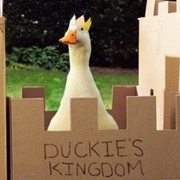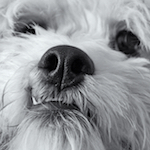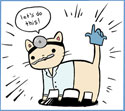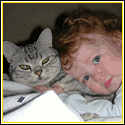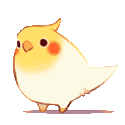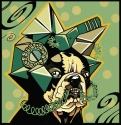|
TShields posted:he'll do nothing but run for the mulch, get pulled away, run at a different angle, get pulled away, run find a weed or something to gnaw on, get pulled away.. it's madness. He wasn't like this 2 days ago. Help? That said, dogs will sometimes chew on sticks, eat mulch or grass (and then puke it up on your bed or your best throw rug). It's no biggie, it's just what dogs do.
|
|
|
|

|
| # ? May 13, 2024 22:10 |
|
Rixatrix posted:Sounds like he's having fun. Limit his access to these things in some way and give him more acceptable alternatives to chew on. He'll forget about it soon enough. Obviously the leash isn't working, can you fence stuff temporarily? Or when he's on leash, distract him so that he doesn't think about the forbidden stuff? My wife is more worried about him choking or it creating a blockage since she works with animals. It's not like he has any lack of chew toys to keep him occupied in the house.
|
|
|
|
I hope this isn't the wrong thread to ask this question in, but I have a question for some behavioral help for an older dog. She's a 9.5 year old English Bull Terrier (we adopted her from a rescue a year ago) and she's very sweet, but she has problems with getting overexcited. The issue is, even though she's improved a lot about being calm and not freaking out over things like feeding time or strange noises or strangers or leash reactivity, emotionally she still tends to hang onto things that surprise her and it lasts for awhile. For example, she got excited by a lawn care guy and was barking her brains out until we got her to calm down and sit, but for the rest of the day, she'll be on a hair-trigger for things she can usually tune out. While I realize stress hormones stay in the system for days, is there any kind of activity (or resting non-activity) we can do with her to help her settle a bit in the hours following a very arousing event? Unfortunately, with things like training games, her overexcitement just bleeds into the game, and she's trying to guess commands instead of waiting to listen to them, she's panting and letting out barks. Periodiko fucked around with this message at 19:53 on Jun 3, 2013 |
|
|
|
My 14 week old lab/sheperd puppy has stopped responding to calls. Prior to this it was pretty much flawless, he would come even in the middle of a crowded dog park. But for some reason starting yesterday he has stopped. He'll look up and see me calling him, then continue doing whatever he was doing. Nothing has changed, I have not scolded/disciplined him for coming to me. I give him treats every time he comes to me when I call. He had previous issues with not coming when called, and at the recommendation of a trainer I moved up to liver treats which was very successful at getting him to come every time, until yesterday. Using the same liver treats he just decides whether he wants to come or not. Is it possible he became bored with the treat? Away all Goats fucked around with this message at 22:11 on Jun 3, 2013 |
|
|
|
Periodiko posted:I hope this isn't the wrong thread to ask this question in, but I have a question for some behavioral help for an older dog. I would actually work on more calming behaviors in general. To start with, I'd check out some of the books on fearful animals: http://www.amazon.com/Cautious-Canine-How-Conquer-Their-Fears/dp/1891767003/ref=sr_1_3?ie=UTF8&qid=1370295580&sr=8-3&keywords=fearful+dog There are also some posts from me linked in the OP of the training thread on mat work and Look at That. I would look into both of these games. Mat work is going to be your friend here, because it's not operant, which is what you're struggling with in some of the other training games. Start here and come on back if you're confused or still struggling. Good luck! Away all Goats posted:My 14 week old lab/sheperd puppy has stopped responding to calls. I bolded the funny parts. This may come as a shock to you, but you do not (and did not) have a rock solid recall at 14 weeks. Period. If you were getting that behavior that soon, that's great, but there is no way it was well-conditioned that quickly. Back up and stick with it. Stop asking for recalls in the dog park and focus on making them continue to be rewarding in situations your dog can handle. Things are going to continue to change a lot over the next year and recalls are a Big Deal.
|
|
|
|
Periodiko posted:I hope this isn't the wrong thread to ask this question in, but I have a question for some behavioral help for an older dog. As well as what Mr. Furious suggested, I would take a look at how your training sessions pan out. Are they too difficult? Too long? Keep in mind that the very act of learning creates stress, so do what you can to understand that and not make it any more stressful than it needs to. Eustress and stress are interpreted the same by the body. Away all Goats posted:My 14 week old lab/sheperd puppy has stopped responding to calls. Young puppies are wonderful because, as far as they're concerned, you are the center of their world. They need you to survive and they have a strong instinct not to wander off too far. Until they mature a little. Now all of a sudden they don't need you to survive, they're curious about the world and they're understanding that there are things in this world much, much more exciting than you. So, pick your battles. Don't let your puppy learn that recall is optional. Don't waste your breath if he's in the middle of a play session, or exploring something interesting. Listen to your trainer and keep working on those recalls. Creating a solid recall around distractions while a dog is off leash is pretty much the most difficult thing you'll ever do with your dog. You'll have to work at it for months and years, and do refresher sessions to keep the recall strong. Try new treats. While I'm training I'll typically have 3-6 different types of treats in my pouch. Liver, lamb lung, hot dogs, kibble, cheese... I'll also rotate which treats I use, so my dogs may go a few months before seeing liver treats, since I'm using mostly chicken or cheese or whatever. Be unpredictable when you recall your pup. Play with him with a ball or a tug, run away so he has to come catch you, toss food at him, do ultra quick fun training sessions where you ask for a spin or a paw or something before giving the food. And keep at it. Above all else, don't let your dog think that "come" is optional. Manage him and your environment so coming to you is always the most interesting, best choice.
|
|
|
|
MrFurious posted:I bolded the funny parts. This may come as a shock to you, but you do not (and did not) have a rock solid recall at 14 weeks. Period. If you were getting that behavior that soon, that's great, but there is no way it was well-conditioned that quickly. Back up and stick with it. Stop asking for recalls in the dog park and focus on making them continue to be rewarding in situations your dog can handle. Things are going to continue to change a lot over the next year and recalls are a Big Deal. I don't count so well. He's actually 18 weeks, but I guess that doesn't make much a difference. He handles recalls at the dog park really well, I don't call him when he's busy playing with another dog, but usually when he wanders away to an area of the park without dogs or people(which is usually when I take him home, cause he's probably tired). And thanks, I will try mixing up the treats from now on. edit: VVV Yes, He finished getting them all at 4 months and I've been taking him to the dog park since then. Away all Goats fucked around with this message at 02:30 on Jun 4, 2013 |
|
|
|
Just for my sanity, I take it he's had his parvo shots? All three rounds?
|
|
|
|
So, this post is about a puppy, but not mine. I wasn't sure where to put this but here goes. There's a dog in my neighborhood that runs away, a lot. This isn't really an issue; it happens. I have a pretty big fenced-in backyard and I usually leave the gate open unless I'm watching my sister's or my girlfriend's dog. A few times now (probably like 4 times over the past month) a dog has wound up in my backyard. I'm not very dog-savvy so I don't know what kind it is, it's big and has light long wooly hair (I am pretty sure it is not a sheep). I thought it was a fully grown dog but it's very playful and is apparently still teething and still does a lot of puppy stuff. So I check it's collar and the dog is from my neighborhood so I walk it back (kind of, I had to carry it). I find the house and knock on the door and immediately a bunch of birds start squawking and I see a cat wandering around. So they open the door and explain they just got this puppy and she ran away when she opened the door and this is immediately weird to me because your dog bolted out the door and you just...went inside? The dog had a bunch of toys in the front yard (which is not enclosed) so I'm not convinced I'm buying it. I do a bit of work outside my house so it's kind of annoying that a random dog will show up and gently caress my poo poo up but I'm really more concerned that the dog is not really being properly taken care of. It didn't seem sick or underfed or anything but your dog running away five times in a month (just yesterday a woman came to the door with the dog asking if it was mine and the daughter showed up looking for the dog, so) seems like it should elicit some sort of response, be it enclosing your yard or fencing in your patio or something. At the very least, I've never seen them walk the dog or anything and it seemed really anxious and energetic. Should I just let it go and shrug my shoulders or should I talk to them or what?
|
|
|
|
So, our puppy pees.. a lot. A whole lot. Like, more than I feel he should. We'll get home from work, he'll run to the door, we take him out, and he can't stand it so he pees some on the deck. That's fine, I'll wash it off. Then we get him to the yard (just to practice), and he'll pee some more. Then, generally, he'll pee a little bit in the house a few minutes later. Hard to tell if he will or won't, seeing as though we JUST took him out. Then we'll take him out again a few hours later and he'll pee outside then pee in the house again. It's not like he's not peeing a lot outside, because he is. What seems like it should be a full amount. He's just doing it so much that it's causing problems. He'll let us know if he has to go about 75% of the time, and other times he'll just go 5 feet away from you on the kitchen floor. Is this normal for a puppy? Anything I can do to curb this behavior? I can't limit his water supply. It's a "family" water supply for 4 cats and another dog. Another issue we're working through- we have a baby gate up into a spare room that we call the "cat room" because it just has their crap in it right now, and we always feed them in there so the dogs won't try to eat the cat food. The order of operations currently is that we give him food, give the big dog food, then go in and feed the cats. He flips his poo poo when we feed the cats. Like, up jumping on the gate squealing at us until we get out. He'll usually leave his meal behind just to squeal at us behind the baby gate. Is this more of a separation anxiety thing where he can see us but can't get to us?
|
|
|
|
SUPER NEAT TOY posted:So, this post is about a puppy, but not mine. I wasn't sure where to put this but here goes. I'm not aware that you can do anything about this. They just sound like crappy owners. My experience is that most of the time you can't talk to people like this, but feel free to try. The only thing I can say is that in most states, if you have possession of a dog and have been paying its medical and care expenses for some period of time, you can claim legal ownership of the animal. I don't think this really applies to your situation though unless you're looking at taking the dog in the next time it runs away. TShields posted:So, our puppy pees.. a lot. A whole lot. Like, more than I feel he should. We'll get home from work, he'll run to the door, we take him out, and he can't stand it so he pees some on the deck. That's fine, I'll wash it off. Then we get him to the yard (just to practice), and he'll pee some more. Then, generally, he'll pee a little bit in the house a few minutes later. Hard to tell if he will or won't, seeing as though we JUST took him out. Then we'll take him out again a few hours later and he'll pee outside then pee in the house again. It's not like he's not peeing a lot outside, because he is. What seems like it should be a full amount. He's just doing it so much that it's causing problems. He'll let us know if he has to go about 75% of the time, and other times he'll just go 5 feet away from you on the kitchen floor. Is this normal for a puppy? Anything I can do to curb this behavior? I can't limit his water supply. It's a "family" water supply for 4 cats and another dog. Have you been following the housetraining guide in the OP? How old is the puppy? Rule of thumb is that they shouldn't be asked to hold it for more than one hour per month of age. If none of those are an issue, you're due for a vet visit to see what's going on. It could be a variety of things, but most likely is probably a UTI. As far as the gate, if he can still see you that's far more likely to be normal puppy barrier frustration. They're selfish little assholes and they only survive to adulthood because they are fuzzy and adorable in spite of this. Make sure you don't step back over the gate until he's being calm. You may have to bring a book the first few times.
|
|
|
|
MrFurious posted:Have you been following the housetraining guide in the OP? How old is the puppy? Rule of thumb is that they shouldn't be asked to hold it for more than one hour per month of age. If none of those are an issue, you're due for a vet visit to see what's going on. It could be a variety of things, but most likely is probably a UTI. He's roughly 4 months now if the shelter is to be believed. By some miracle, he was fairly house trained when he came to us, so we never started on the timer thing. We have been taking him out with the other dog even if he doesn't necessarily show signs that he needed to go, and he usually goes then anyway. This is happening within minutes of bringing him back in, but it's not consistent so we can't plan for it. Half the time when we take him out he decides he wants to eat the entire yard piece by piece so we have to take him in rather than let him be idle and wait a half hour to see if he needs to pee again. Edit: It's a boy, btw.. rare for a male to get a UTI. TShields fucked around with this message at 18:03 on Jun 7, 2013 |
|
|
|
TShields posted:He's roughly 4 months now if the shelter is to be believed. By some miracle, he was fairly house trained when he came to us, so we never started on the timer thing. We have been taking him out with the other dog even if he doesn't necessarily show signs that he needed to go, and he usually goes then anyway. This is happening within minutes of bringing him back in, but it's not consistent so we can't plan for it. Half the time when we take him out he decides he wants to eat the entire yard piece by piece so we have to take him in rather than let him be idle and wait a half hour to see if he needs to pee again. There are quite a few things other than a UTI that can cause polyuria (too much urination). Go see a vet.
|
|
|
|
I should probably note that my wife is a vet tech and he's been in with her several times due to an upper respiratory infection that won't seem to go away, and they haven't noticed anything weird with him. Could it be related to the fact that we're at work for 8 hours a day and he hasn't been going in his kennel, so he ends up pretty full up when we get home? I think they finally got him on the right meds for the nasal stuff, but not before he's gotten snot all over the carpet and our clothes.
|
|
|
|
I mean it could be. 8 hours is a long time for a 4 month old puppy. However, if you're noticing a continued high amount of urine output from him even when he's not crated, it could also be something medical that you wouldn't want to water restrict for, which is what most non vet people will tell you to do to control the flood. Polyuria usually goes along with polydipsia (drinking too much). If this is a continued problem, you should monitor intake and output and consider looking more into it.
|
|
|
|
Ugh.. see, this is what I don't understand. At 6:45 a.m., we woke up and took him out (on a Sunday, no less- to keep with a work week routine). He peed and pooped. We went back to sleep. By 8:45 a.m., he had peed and pooped on the floor. What the gently caress? Why wasn't that all taken care of at 6:45? Also, he's decided this one hallway corner is a chew toy when we're asleep. Any way to discourage that? He has real toys.
|
|
|
|
TShields posted:Ugh.. see, this is what I don't understand. At 6:45 a.m., we woke up and took him out (on a Sunday, no less- to keep with a work week routine). He peed and pooped. We went back to sleep. By 8:45 a.m., he had peed and pooped on the floor. What the gently caress? Why wasn't that all taken care of at 6:45? You've probably mentioned it already, but is he crate trained? Any reason why you didn't put him back in the crate while you went back to sleep? My general rule of thumb is that a puppy is crated, gated in an area you know he won't mess, or under your direct supervision. Don't bother even thinking of relaxing the rules until your pup has gone one full month with zero accidents. The more careful you are now the better your housetraining will be and the more trustworthy your dog will be for the rest of its life. For the hallway, spray it with a healthy dose of Bitter Apple, or gate it off.
|
|
|
|
a life less posted:You've probably mentioned it already, but is he crate trained? Any reason why you didn't put him back in the crate while you went back to sleep? My general rule of thumb is that a puppy is crated, gated in an area you know he won't mess, or under your direct supervision. Don't bother even thinking of relaxing the rules until your pup has gone one full month with zero accidents. The more careful you are now the better your housetraining will be and the more trustworthy your dog will be for the rest of its life. He doesn't sleep in his crate overnight. He did the first few nights, then one night my wife fell asleep on the couch and opted to sleep there all night, and he was snuggled up next to her. He did great all night, so we haven't been putting him in there. That, and I kinda feel like if we're putting him in his crate all night (7-8 hours), then waking up, letting him wander the house for like an hour, then crating him for another 8-9 hours while we're at work.. that's kinda harsh. I feel like he'd get restless and start thrashing around and destroy his crate bed or something.
|
|
|
|
With enough interaction and exercise, crating him shouldn't be that bad. Consider an x-pen if you don't want to use a crate. But basically this is why you woke up to pee/poo in your house this morning. I consider a month of hard core management worth 10+ years of reliable house breaking.
|
|
|
|
If night time is not an issue, consider crating him on weekends for a couple of hours while you sleep after taking him out for the first time.
|
|
|
|
TShields posted:I should probably note that my wife is a vet tech and he's been in with her several times due to an upper respiratory infection that won't seem to go away, and they haven't noticed anything weird with him. Could it be related to the fact that we're at work for 8 hours a day and he hasn't been going in his kennel, so he ends up pretty full up when we get home? Could you consider finding someone to let him out in the middle of the day as well? I realize the problem isn't him going in the crate but that's still a really long time to hold it for a puppy and holding it for a long time like that isn't the greatest thing in the world. I feel like my dog didn't really become fully housetrained until she totally trusted that someone was going to let her out before she got really uncomfortable (well, and until she matured a bit).
|
|
|
|
I have a minor puppy problem I don't understand. When we first got her, she was not house trained, and went in a few spots. We blocked off a lot of the house that she was using and after three weeks, we had no accidents at all, and she will pee on command outside. She also can hold it for several hours when we are out, no problem. Not that we want her to, but she only wants to go in our yard right now. She also goes through the whole night now without having to get up to go outside. The issue is, she just started urinating in a spot right where the rest of the house is blocked off, and sometimes like 30 minutes after she was outside. I don't think it's a UTI, as she also went poop in the same spot. She still goes outside regularly, but now once or twice a day she will go inside and she is very sneaky about it, waiting until I stop paying attention for a second. I feel like at this point, even if I stem this off by watching her 24 hours a day, if I at some point open the house up, it will start all over again. This is the second time this has started up after a couple of successful weeks of no accidents. We do have a training class once a week, so I will run it by the instructor as well. Maybe I just need more patients. We don't use a crate at all.
|
|
|
|
Rusty posted:I have a minor puppy problem I don't understand. When we first got her, she was not house trained, and went in a few spots. We blocked off a lot of the house that she was using and after three weeks, we had no accidents at all, and she will pee on command outside. She also can hold it for several hours when we are out, no problem. Not that we want her to, but she only wants to go in our yard right now. She also goes through the whole night now without having to get up to go outside. The issue is, she just started urinating in a spot right where the rest of the house is blocked off, and sometimes like 30 minutes after she was outside. I don't think it's a UTI, as she also went poop in the same spot. She still goes outside regularly, but now once or twice a day she will go inside and she is very sneaky about it, waiting until I stop paying attention for a second. I feel like at this point, even if I stem this off by watching her 24 hours a day, if I at some point open the house up, it will start all over again. This is the second time this has started up after a couple of successful weeks of no accidents. We do have a training class once a week, so I will run it by the instructor as well. Maybe I just need more patients. Clean the area she pooped and peed in well with an enzymatic cleaner like Nature's Miracle. She's a puppy so she should never be out of your sight. Tether her to you with a hands free leash or loop it around your belt or something.
|
|
|
|
I'd go back to tethering/gating her in an area away from where she's soiling. Another tactic is to spend more time in the area where she's soiling (after making sure it's been well cleaned with an enzymatic cleaner) so she begins to understand that the whole house is her "den". If she spends time there, she'll be less likely to see it as a toilet in a tucked away portion of the house. But again, coupled with that, go back to basics.
|
|
|
|
My fiancee and I are going to see three Cane Corso pups tomorrow and will likely take one of them home with us. They are all female and from a reputable breeder. I've read the OP and supplemental posts in this thread, and the thing I'm the most concerned about is our existing dog getting along with the puppy. Chloe is a pug/jack russell/god-knows-what mix. She tends to be fairly dominant with dogs around her size to 10-or-so pounds larger. She usually starts out being aggressive and unpleasant but then becomes friends quickly. Are there any specific warning signs I should look out for or additional techniques to make sure she and the new little girl get along? I figure with the closeness in size, I don't need to worry too much about Chloe hurting the puppy, especially under supervision.
|
|
|
|
Thanks for the advice, I figured as much and have gone back to keeping her in my sight at all times. I was slacking because she had done so well, but back to the basics again.
|
|
|
|
Martello posted:
I'd keep them separate for a few weeks, and follow the introduction guide in the OP. I'd work hard to get the puppy to give your existing dog space and to see you as her playmate, not Chloe. The biggest sign people miss when it comes to dog fights is the stillness that precedes an explosion. Watch for stiff body language and stillness. If that happens, call Chloe away. Otherwise just use common sense and ensure your existing dog has plenty of space and one on one time with you.
|
|
|
|
Martello posted:She tends to be fairly dominant with dogs around her size to 10-or-so pounds larger. She usually starts out being aggressive and unpleasant but then becomes friends quickly. Are there any specific warning signs I should look out for or additional techniques to make sure she and the new little girl get along? I figure with the closeness in size, I don't need to worry too much about Chloe hurting the puppy, especially under supervision. Be careful using the D word. If you've spent any time around here, you know that it's usage alone is a big red flag, even when it's used appropriately, which is rare. As far as introductions, I would start by allowing them to sniff on opposing sides of a baby gate or something similar. Your description of Chloe seems to indicate that she is potentially a little apprehensive of new dogs, but she may also have some bad play manners as well. During the intro, you want to be watching Chloe's body language closely. Body language is not a hard science, because it's all contextual to the environment and the animal in question, but you want to be watching for signs that are usually bad - hard stares, stiff postures, low growling, lip lifts (baring teeth), and things like that. If you see this, Chloe is not happy about what's happening and you need to be counter conditioning the puppy's presence. I would start doing this initially anyways. Your fiancee and yourself pair yourself with one of the dogs and basically shove treats into each dog's mouth while they are close to each other and in sight of each other. Once you take the gate down, I'd do first interactions on leash, but leash is loose. This is how we handle trouble puppies in class. The reactive dog will be on leash, but the handler is very, very, very careful to keep that leash loose at all times. The reason the leash is on is that if there is a reactive episode, the leash is the fastest way to remove that dog from the situation without putting the handler in danger of a redirection bite and not allowing that dog to do harm to another. If Chloe reacts poorly, use the leash to remove her. You don't want to be harsh, because you're not trying to give a collar correction, but you do want to make sure that she can't actually hurt the puppy and don't give her any chance to practice that behavior. If you have an episode like this, I would go back to the gate and focus hard on counter conditioning again.
|
|
|
|
How can I help my new dog get used to the ambient people/cars/whatever sounds? Talking to his foster, she said he was very sound-sensitive when he was first settling in with her, and it sounds like that's what's going on now. I've only had him since yesterday evening but he spent last night gruff-ing and leading up to some barks at mystery things we couldn't hear, cars, curtains moving in the wind, people walking by outside (we're on the 4th floor so nothing is really that close or loud). He was living in a townhouse with lots of foot traffic and people noise, so it's not like he's come from a super quiet environment into the middle of the city, and if he settles in here similarly to how he did at his foster, he should be okay with things after a while. I just want to make sure I don't accidentally turn the gruffs into a barking problem.
|
|
|
|
Thanks for the advice, I'll go with it when we bring the new puppy home tomorrow. MrFurious posted:Be careful using the D word. If you've spent any time around here, you know that it's usage alone is a big red flag, even when it's used appropriately, which is rare. Care to elaborate here? I have no idea whatsoever what you're talking about.
|
|
|
|
Martello posted:Care to elaborate here? I have no idea whatsoever what you're talking about. When your dog is interacting with other dogs she isn't being 'dominant'. She just sounds nervous.
|
|
|
|
Martello posted:
He's referring to "dominance," which is not an actual canine personality trait like celebrities and pop culture want you to believe it is. Just technically speaking, a dog cannot be dominant. The concept requires a dyadic relationship and a resource to even be relevant. There's an excellent article on the subject called "Dog Whispering in the 21st Century" I can link you to (when I'm back at my computer) if you're interested.
|
|
|
|
Dog Whispering in the 21st Century. Here you go.
|
|
|
|
Fat Dio posted:How can I help my new dog get used to the ambient people/cars/whatever sounds? Talking to his foster, she said he was very sound-sensitive when he was first settling in with her, and it sounds like that's what's going on now. I've only had him since yesterday evening but he spent last night gruff-ing and leading up to some barks at mystery things we couldn't hear, cars, curtains moving in the wind, people walking by outside (we're on the 4th floor so nothing is really that close or loud). He was living in a townhouse with lots of foot traffic and people noise, so it's not like he's come from a super quiet environment into the middle of the city, and if he settles in here similarly to how he did at his foster, he should be okay with things after a while. Take a look at the OP of the training thread. I've got a post linked in there on mat work. I'd start very quiet and run through at least a few days of the relaxation protocol. Then I'd start back at day 1 with the window open to let in some other sounds. Radio, television, whatever it is that causes some issues. Make sure you start with the stimulus at very low effect. So, for example, if the TV causes him problems, keep it at a low volume and work in a separate room where you can barely hear it and slowly increase from there by either getting closer or turning up the volume.
|
|
|
|
My question is one puppy or two puppies that are brothers. They are both almost 16 weeks old. They were put in the pound at days old and the rescue has no idea why or what kind of dogs they are. Speculating Great Pyrenees/Shepherd mixes. They were bottle fed originally and then they contracted parvo and both survived. Their last round of parvo vaccination shots are toward the end of June. They will also be available end of June or early July for adoption. I am absolutely going to get one of them, but I'd like to get both. It seems every article/blog post/piece of advise says DO NOT GET TWO PUPPIES AT THE SAME TIME. I want to ignore all that, mostly because I realize they'll find my most prized possession and poo poo all over it and then chew it up. However, a single puppy will do that by himself. They are brothers. They never were abused and have been pretty coddled and spoiled through their entire lives so far. I feel bad for them, and I want two dogs in the long run. Now that I've cleared that up, I'm in a relationship but these will be MY dogs (according to my girlfriend). I work from home in a small'ish apartment and am planning on buying a house in Nov/Dec. Girlfriend doesn't live with me in this apartment. My apartment complex has a large dog run that is nearly the size of a football field and is enclosed, there are also 2 public dog parks within 5 miles of me. No aggressive breeds, 2 dogs per apartment, no weight restrictions. Are Great Pyrenees considered aggressive breeds? I'm getting about a 70/30 vibe for adopting both of them. Mostly from friends who have adopted two puppies from the same litters and love the poo poo out of them, or only one and after the puppy phase regretted not adopted two. Of course it's a terrible idea. I'm fully aware of that. I think after the puppy phase grows out, I'll be more than happy that I have two dogs (hopefully well behaved and extremely handsome) that give me joy every day. I'm home all day, even though I'm in an apartment they'll have space to stretch their legs, and I'm extremely patient (unless they eat my Pearl Jam Ten CD). I plan to crate them and spend time separately with each of them for bonding and training purposes. I think I can do this and I think I'm in a place to be very comfortable doing this. In no way do I want a #1 behaved dog who can do all sorts of tricks. I just would like them to be well behaved and know simple commands like sit, down, stay, and fetch me another Coors light. Anyway, is there any super important reason I should absolutely avoid getting two puppies that are brothers? Please enlighten me.
|
|
|
|
Google littermate syndrome. Or hit this link: http://paws4udogs.wordpress.com/2012/03/30/littermate-syndrome/ Basically, there's been some studies recently of littermate potential future guide dogs placed in caregiver homes together. Inevitably, one of the dogs washes out of the program. The wash out rate of littermates housed together is much greater than the normal wash out rate of pups living in homes alone. Basically, one dog never reaches its full potential and will be more timid than the other. One dog will always sort of live in the other dog's shadow and won't be as well equipped to deal with the world as it would have been if it were raised alone. You sound well prepared, but it's still not a good idea to get two puppies at once.
|
|
|
|
I read that article and the major part that stuck out to me was:quote:They often fail to bond to their human family as strongly as they otherwise would, or sometimes at all. At social maturity, these puppies may begin fighting with one another, sometimes quite severely. I'm not denouncing the article, but I don't expect to have guide dogs or professional service dogs by any means. Even if one doesn't reach it's full potential, I can't imagine that'd take away from their ability to be well behaved and great family dogs. I have the time to spend on both and the $ to cover double the expenditures. The biggest thing for me was getting a dog in the first place (responsibility), but I've already decided to climb that hill after 2 years of skepticism. My sisters family has two dogs are sweet toward her 3 kids, but I can see them occasionally get on each others nerves. Similar to how I pushed my brothers buttons until he would sock me and knock the wind out of me. They still love playing with each other and spend most the time laying next to each other. I love playing with my brother, but I don't ever lay next to him. I'm not worried about one dog having less "potential" than the other, mostly because I'm going to love both regardless of what personalities they develop. I can't imagine from the dogs my family has owned in the past that one will be that much more superior as a family dog than the other.
|
|
|
|
Dr. Freeman posted:It seems every article/blog post/piece of advise says DO NOT GET TWO PUPPIES AT THE SAME TIME. The general rule of thumb here is two and preferably three years between puppies. This ensures the older dog should be well mannered and most often keeps fights from happening even when the dogs are unaltered and of the same gender.
|
|
|
|
Pyrs already don't really give a crap about people. Two pyrs that are raised together will just crawl up each others' asses and form a feedback loop of barking, guarding random objects, ignoring you, and running away at every opportunity.
|
|
|
|

|
| # ? May 13, 2024 22:10 |
|
A friend of a friend of mine got two Plummer terrier bitches as puppies and raised them together. One of the dogs iirc was really anxious about strange people, and eventually they had to rehome one because they developed bitch aggression and would turn into screaming pillars of dog rage at the sight of each other.
|
|
|






